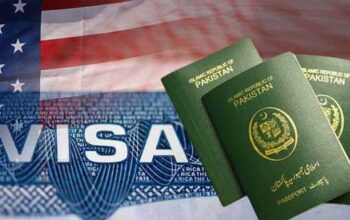By Staff Reporter
ISLAMABAD: A meeting of defence ministers from the Shanghai Cooperation Organisation (SCO) collapsed into discord on Thursday, as India refused to sign a joint statement that omitted a deadly terrorist attack in occupied Kashmir.
Pakistan’s Defence Minister Khawaja Asif used the platform in this eastern Chinese port city to trumpet his nation’s counter-terrorism credentials, but the session exposed a widening chasm within the 10-nation bloc, undermining its goal of regional unity.
The SCO, comprising China, Russia, India, Pakistan, Iran, and five Central Asian states, gathered in Qingdao, a coastal hub hosting China’s northern naval fleet, ahead of its leaders’ summit this fall. The defence ministers’ meeting aimed to forge a united front on security issues, but the India-Pakistan rivalry upended that ambition, leaving the joint communique unsigned.
India’s objection centered on the document’s silence about the April 22 attack in Pahalgam, occupied Kashmir, which claimed 26 lives, mostly Indian Hindu tourists. New Delhi calls it a terrorist act with “cross-border linkages”, a clear jab at Pakistan, which denies any role.
“Certain members could not reach consensus on certain issues, and hence the document could not be finalised on our side,” Indian foreign ministry spokesperson Randhir Jaiswal told reporters, as reported by The Times of India. “India wanted concerns on terrorism reflected in the document, which was not acceptable to one particular country, and therefore, the statement was not adopted.”
Pakistan went unnamed, but the target was obvious.
A Pakistani official, said India’s stance left it isolated. “India faced diplomatic isolation at the Shanghai Cooperation Organisation meeting, where Pakistan achieved significant success,” Dawn newspaper quoted the official as saying. Officials said India “failed to link the Pahalgam incident to Pakistan in the joint communique, declined to sign the communique to cover its embarrassment, received no support from any member state on the Pahalgam issue and also stood alone in its differing stance on Israeli aggression against Iran.”
In his speech, Asif struck a defiant tone, condemning terrorism broadly while swiping at regional and global foes. “Terrorism is a common threat. Pakistan calls on all states to desist from politicising the joint effort of the International Community to fight the means of terrorism to deflect attention from their internal failures,” he said, according to Pakistan’s state-run PTV News.
He denounced the Pahalgam attack but pivoted to accuse unnamed states of sponsoring violence elsewhere, citing the Jaffar Express attack in Balochistan. “We call upon all states to hold these states and their state actions to account who planned, financed and sponsored the terrorist attack,” Asif declared.
Pakistan’s defence minister doubled down, pointing to Kulbhushan Jadhav, an Indian naval officer arrested in 2016, who confessed to orchestrating terror attacks in Pakistan. “We have in our custody … a serving Naval Commander Kulbhushan Jadhav [who] confessed to financing, planning and perpetrating multiple terrorist attacks in Pakistan,” Asif said. He also criticized Israel’s recent 12-day assault on Iran, tying it to broader instability.
Pakistan’s minister touted his country’s fight against groups like the Tehreek-i-Taliban Pakistan, the Balochistan Liberation Army, and the Islamic State. “Pakistan denounced terrorism in all of its forms,” he said, urging SCO members to bolster cooperation on cyber security, anti-narcotics, and counter-extremism—, dubbed the bloc’s “three evils.” He pushed for a Gaza ceasefire and a stable Afghanistan to boost “regional connectivity and long-term stability.”
India’s Defence Minister Rajnath Singh countered with his own pointed remarks. “Peace and prosperity cannot co-exist with terrorism and proliferation of weapons of mass destruction in the hands of non-state actors and terror groups. Dealing with these challenges requires decisive action,” he said, per a defence ministry statement.
A source familiar with the talks, speaking anonymously to The Associated Press, said Singh pressed the SCO to “condemn countries that use cross-border terrorism as an instrument of policy and provide shelter to terrorists”, an unmistakable dig at Pakistan.
The rift traces back to the Pahalgam attack, which sparked a fierce military exchange. India launched missile strikes into Pakistan, killing 33 civilians and injuring 76 across six sites, according to Pakistan’s Inter-Services Public Relations. Pakistan hit back under Operation Bunyan-um-Marsoos, downing five Indian jets and striking military targets along the Line of Control. A US-brokered ceasefire on May 10 paused the worst clash between the nuclear-armed neighbors in years. Thursday’s meeting was their ministers’ first face-to-face since.
China, the SCO’s linchpin, downplayed the fiasco. A defence ministry spokesperson called the meeting “successful” but offered no elaboration. Yet the bloc, a key plank in Beijing’s push to rival Western influence, struggles to paper over such fractures. India saw the draft as tilted toward Pakistan, spotlighting Balochistan, where Islamabad accuses New Delhi of stoking unrest, while ignoring Pahalgam.
Singh privately called it “Pakistan’s narrative,” the AP source said.
The SCO’s lofty aim of stabilizing a turbulent region hangs in the balance, with India and Pakistan’s animosity threatening to stall progress. For now, Qingdao’s talks revealed more about the bloc’s limits than its potential.
Copyright © 2021 Independent Pakistan | All rights reserved




